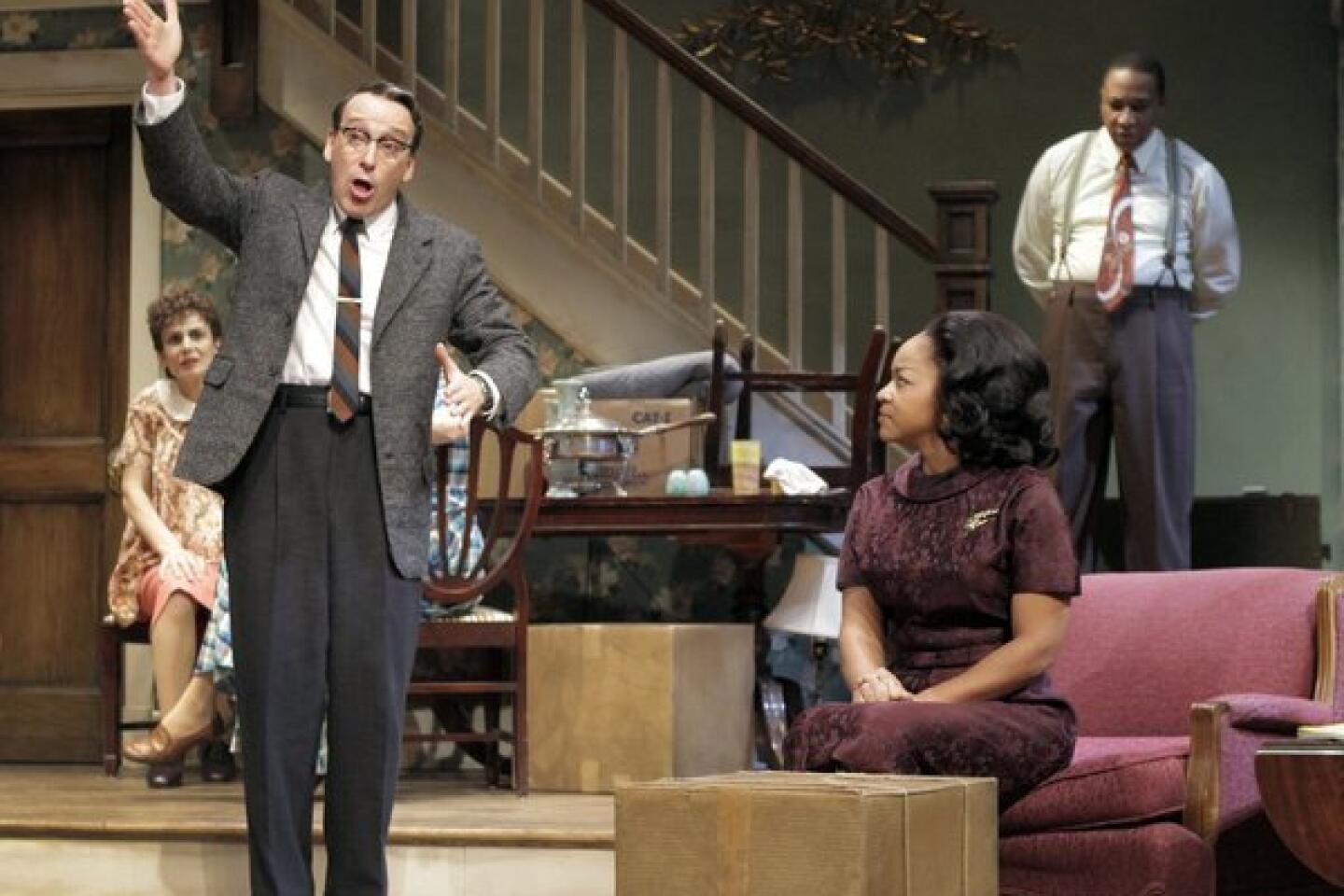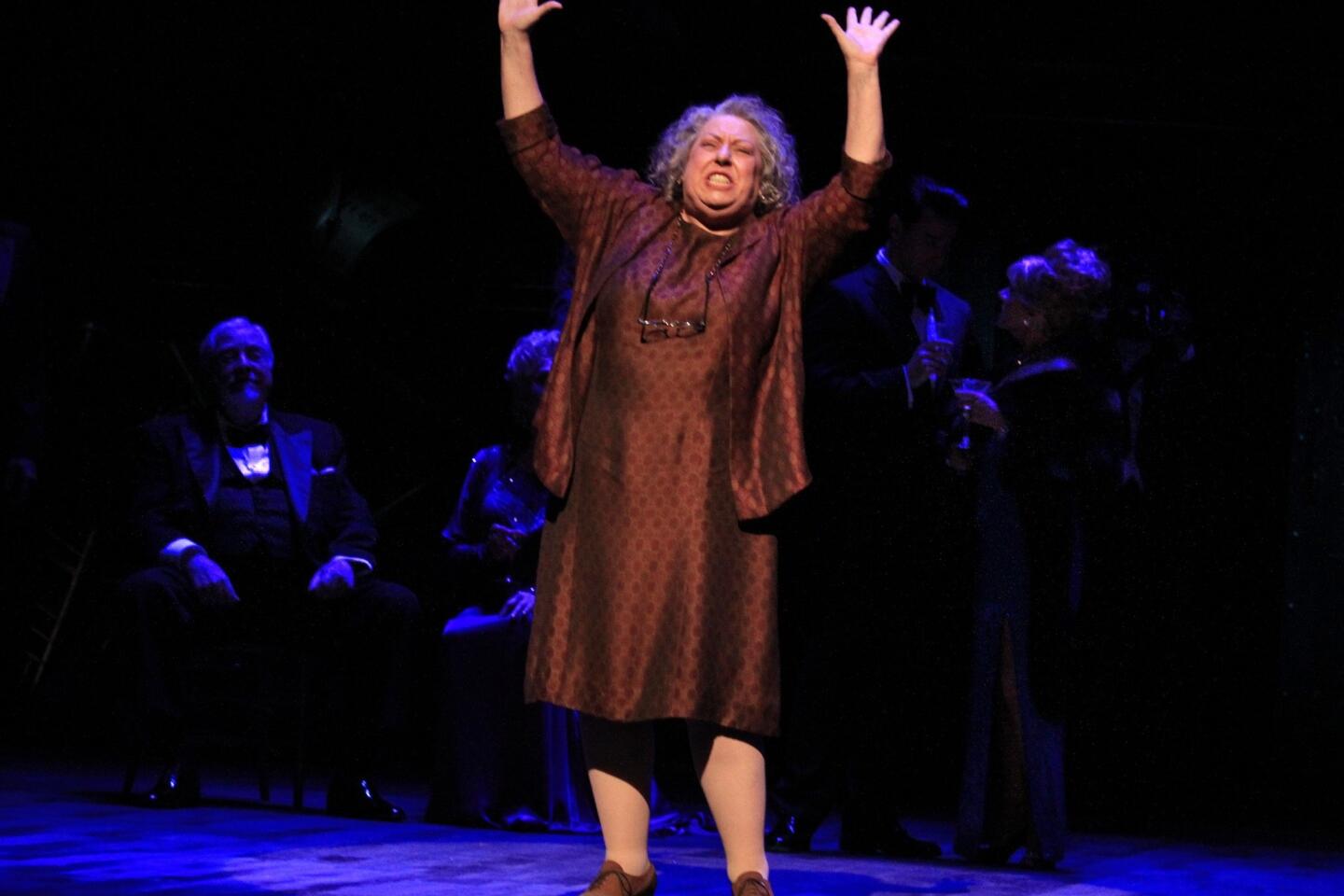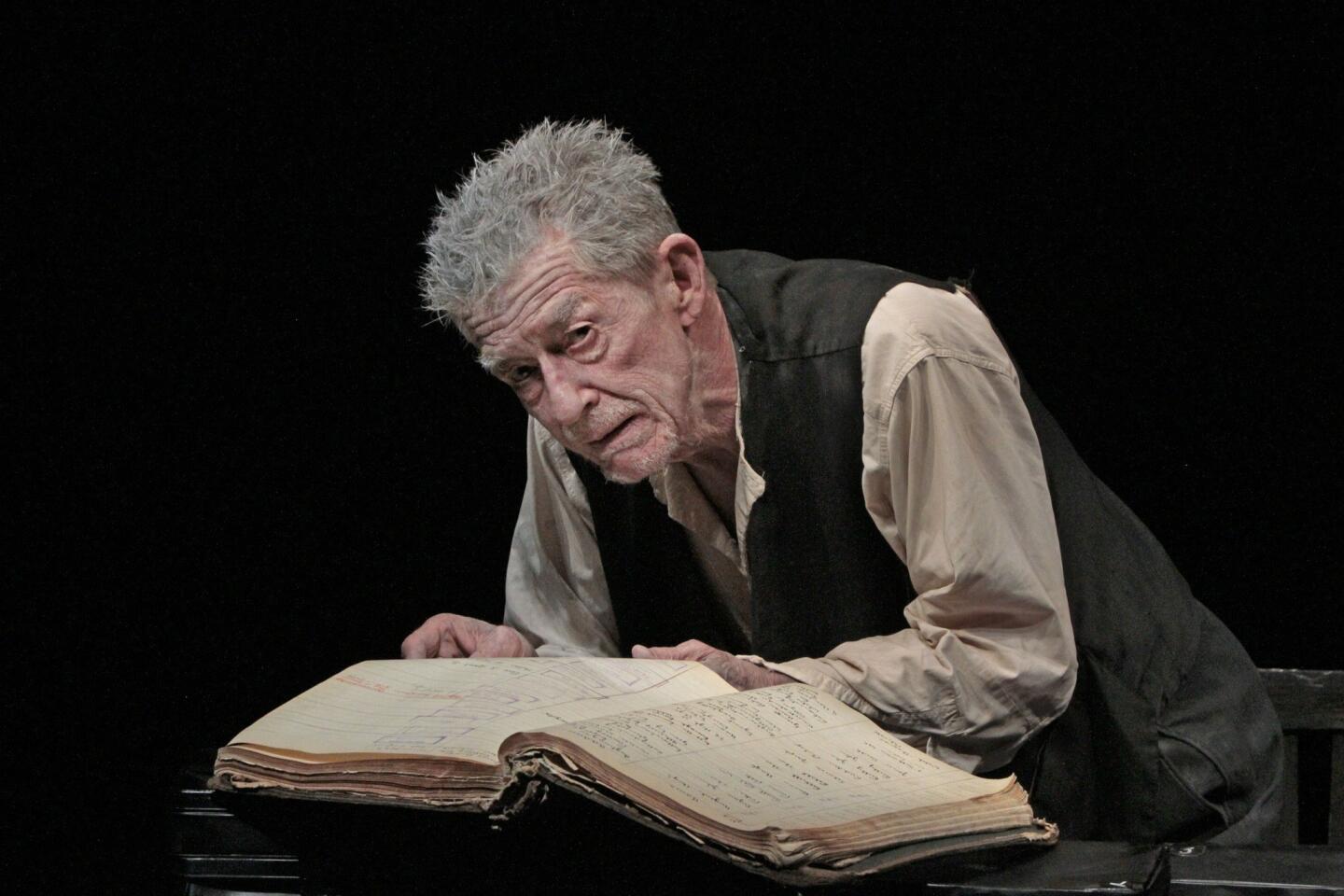Review: ’12 Angry Men,’ cast in black and white, misses the gray
Direct from the age of black-and-white television, Reginald Rose’s “12 Angry Men” has been redeployed to confront the issue of race relations.
This Pasadena Playhouse production, which opened Sunday under the direction of artistic director Sheldon Epps, has evenly cast African American and white actors as the dozen jurors who end up splitting here along racial lines.
If the result seems, well, a little too black and white for an era that, while hardly post-racial, has a bit too much gray for such a neatly polarized scheme, the play still has a way of ensnaring an audience’s attention. Rose’s heavily carpentered writing lets the nuts and bolts stick out, but it makes one of the linchpins of democracy — the right to a jury of one’s peers — an engine of dramatic suspense.
PHOTOS: Arts and culture in pictures by The Times
First presented on television in 1954, Rose’s drama is best known from the 1957 film directed by Sidney Lumet and starring Henry Fonda as the dissenting juror in a murder trial who insists on deliberating despite the seemingly open-and-shut nature of the case.
The stage version has long been a crowd-pleaser, taking its place with “Inherit the Wind” in a category of drama that turns civics into gripping entertainment. The Roundabout Theatre Company production, which came to the Ahmanson Theatre in 2007, showed that the play still crackles when performed by actors willing to invest their creaky roles with gritty specificity.
That same level of acting isn’t on display in Epps’ attractively mounted revival. It’s not that the performers aren’t up to the job but that the production is focused on broader racial concerns. For the most part, the actors don’t burrow deeply into their roles. Instead, stereotypes are allowed to collide into one another, bumper-car style, in a production that sacrifices granular psychology for generalized sociology.
CRITICS’ PICKS: What to watch, where to go, what to eat
Ironically, the updated concept makes the play seem even more old-fashioned. The scenic design by Stephanie Kerley Schwartz lends the jury room the slickness of a boutique hotel, but many of the figures inhabiting the space, particularly those played by white actors, seem like relics from the Golden Age of television.
Their antique quality is thrown into relief by the nattily dressed Juror 8 (Jason George), the initial holdout in the guilty verdict who could very well be guest-starring on “Law & Order” along with Juror 2 (Jeff Williams), the shy and anxious egghead sporting cool intellectual glasses. Juror 10 (Bradford Tatum), the arrant bigot of the group, has tattoos that would be right at home today on Venice’s Abbot Kinney Boulevard, but Juror Three (Gregory North), the bully with the explosive temper, could be appearing in the original broadcast along with Juror 7 (Barry Pearl) and Juror 4 (Robert Picardo).
The playbill sets the time as “Then … and Now,” making clear that a decision hasn’t been reached about the period. This type of fuzziness is commonplace in revivals of classics (if I had a nickel for every Shakespeare production vaguely signaling fascist Italy!), but the subject matter is too time sensitive for this kind of fudging.
PHOTOS: LA Opera through the years
“12 Angry Men” was first presented on television the same year of Brown vs. Board of Education, the landmark Supreme Court ruling declaring segregation in public schools to be unconstitutional. Today an African American occupies the highest office of the land. The disease of racism has hardly been eradicated in the intervening years, but 2013 isn’t 1954.
Questions about Epps’ production kept distracting me from the drama. For example, why wasn’t there other minority representation? The suggestion in the play is that the accused, a kid from “the slums,” is Puerto Rican. If the jury is no longer 12 fuming white guys, why not some Latino or Asian or female jurors?
Perhaps because that might complicate a production that wants to make an unambiguous point about racial prejudice and the justice system. This revival of “12 Angry Men” was inspired in part by current events (such as the fatal shooting of Trayvon Martin and the ensuing George Zimmerman trial) that routinely get the whole nation talking but often at cross-purposes. Epps wants to extend the public conversation, but I’m not sure that Rose’s play is the ideal vehicle for such a noble intention.
CHEAT SHEET: Fall arts preview
Except for the introduction of a few racial epithets, the text hasn’t been radically altered, and there’s only so much Epps can do directorially to raise contemporary concerns. What’s more, his production doesn’t take into account the fact that heterogeneous groups speak differently than homogeneous groups, particularly when it comes to the tinderbox of cultural differences. Not all the slurs and bellowing sentiments are credible in this new context.
Why didn’t the Pasadena Playhouse, working perhaps in tandem with the development wing of a television network, commission a local writer to offer us a 21st century “12 Angry Men,” a script that could more subtly engage the issues that Epps is right to want to communally address at this theater?
Artistically speaking, “12 Angry Men” is a relatively safe choice, guaranteed to appeal to theatergoers who appreciate comfortable familiarity and an edifying moral tone. Epps injects some risk by making his production about racial bias, but I wish he and his theater were more ambitious. The play is too blunt an instrument for a topic badly in need of more incisive dissection.
------------------------------
‘12 Angry Men’
Where: The Pasadena Playhouse, 39 South El Molino Ave., Pasadena
When: 8 p.m. Tuesdays-Fridays, 4 and 8 p.m. Saturdays, 2 and 7 p.m. Sundays. Ends Dec. 1.
Tickets: $38-$72
Contact: (626) 356-7529 or https://www.PasadenaPlayhouse.org
Running time: 2 hours
More to Read
The biggest entertainment stories
Get our big stories about Hollywood, film, television, music, arts, culture and more right in your inbox as soon as they publish.
You may occasionally receive promotional content from the Los Angeles Times.














